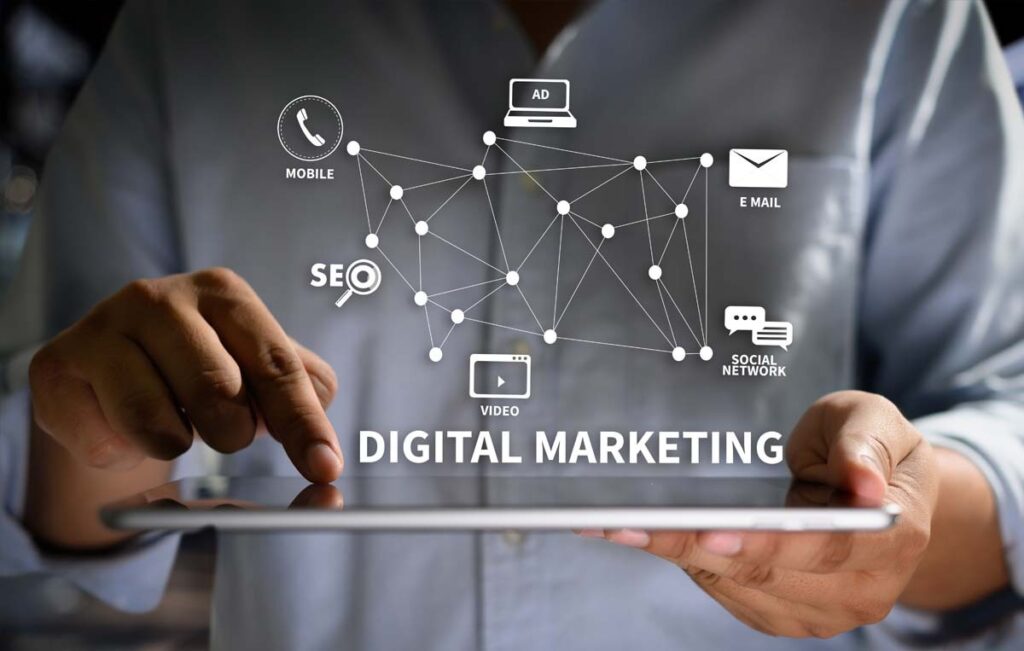The Who, What, Why, & How of Digital Marketing
Digital marketing has become a crucial technique for companies to engage with their target audience, increase brand awareness, and spur growth in today’s quick-paced, technologically advanced world. This in-depth manual delves into the fundamental ideas of digital marketing, as well as its importance, types, the job of a digital marketer, the differences between inbound and outbound marketing, how it applies to different kinds of firms, and helpful advice on how to carry out an effective campaign.
What is Digital Marketing?
Digital marketing is the practice of promoting goods, services, or brands to a specific audience through the use of digital channels, platforms, and technology. Search engine optimization (SEO), social media marketing, content marketing, email marketing, pay-per-click advertising, and other internet strategies are all included in this broad category. Digital marketing is to attract potential clients, increase website traffic, produce leads, and finally turn them into devoted clients.
Why is Digital Marketing Important?
Global Reach: With the help of digital marketing, businesses can connect with customers around the world, shattering geographic boundaries and extending their market reach.
Cost-Effectiveness: Digital marketing frequently provides a more economical means of reaching a broad audience when compared to traditional marketing strategies.
Measurable Results: Real-time tracking and analysis of digital marketing initiatives can offer insightful information about the efficacy of various tactics.
Targeted Audience: Precise targeting options allow businesses to focus their efforts on specific demographics, increasing the likelihood of conversions.
Brand Building: Consistent online presence through digital marketing helps in building and maintaining a strong brand image.
Types of Digital Marketing
Search Engine Optimization (SEO): Optimizing website content to rank higher in search engine results, thereby increasing organic traffic.
Social Media Marketing: Utilizing social platforms like Facebook, Instagram, Twitter, etc., to engage with audiences, promote content, and drive traffic.
Content Marketing: Creating valuable and relevant content to attract and retain an audience, with the aim of converting them into customers.
Email Marketing: Sending targeted emails to nurture leads, promote products, and maintain customer relationships.
Pay-Per-Click (PPC) Advertising: Placing ads on search engines or social media platforms and paying only when users click on them.
Affiliate Marketing: Collaborating with affiliates to promote products, with commissions earned for each sale generated through their efforts.
Influencer Marketing: Partnering with influential individuals in a niche to promote products or services to their followers.
What Does a Digital Marketer Do?
Digital marketers are responsible for crafting and executing online marketing strategies. Their tasks include:
- Conducting market research to identify target audiences and trends.
- Managing and analyzing digital campaigns for optimal results.
- Utilizing SEO techniques to improve online visibility.
- Monitoring and engaging with audiences on social media.
- Analyzing data to make data-driven decisions for campaign optimization.

Inbound Marketing vs. Digital Marketing: Which Is It?
Inbound marketing is a subset of digital marketing that focuses on attracting customers through valuable content and experiences. Digital marketing encompasses a broader range of tactics that include both inbound and outbound approaches.
Does Digital Marketing Work for All Businesses?
Yes, digital marketing can be adapted for businesses of all sizes and industries. The strategies and platforms used may vary, but the fundamental principles of reaching and engaging a target audience remain consistent.
How to Do Digital Marketing
Set Clear Goals: Define specific, measurable, achievable, relevant, and time-bound (SMART) goals for your campaigns.
Know Your Audience: Understand your target audience’s preferences, behaviors, and pain points.
Choose Appropriate Channels: Select the digital marketing channels that align with your audience and goals.
Create Compelling Content: Develop high-quality, relevant, and engaging content that resonates with your audience.
Optimize for SEO: Implement on-page and off-page SEO techniques to improve your website’s search engine rankings.
Leverage Social Media: Engage with your audience on social platforms, sharing valuable content and fostering interactions.
Implement Paid Advertising: Use PPC, display ads, or social media ads to reach a wider audience quickly.
Monitor and Analyze: Continuously track your campaigns’ performance, analyze data, and make adjustments for optimization.
Digital Marketing Examples
Nike: Nike’s digital marketing includes engaging social media campaigns, influencer collaborations, and interactive apps that connect with their audience.
HubSpot: HubSpot excels in content marketing, offering valuable resources like blogs, webinars, and templates that attract and nurture leads.
Coca-Cola: Coca-Cola’s personalized email marketing campaigns resonate with individual customer preferences, driving brand loyalt
Amazon: Amazon’s effective use of PPC advertising ensures that its products appear at the top of search engine results.
Dollar Shave Club: This company gained massive popularity through humorous and engaging video content shared on social media
A vital strategy in today’s company environment, digital marketing is dynamic and always changing. Businesses may use digital marketing to connect with their audience, spur growth, and experience long-term success by grasping its fundamental ideas, utilizing a variety of strategies, and keeping up with the most recent trends.
FAQ
What is the purpose of digital marketing?
The purpose of digital marketing is to effectively promote products, services, or ideas to a target audience through various online channels. It aims to build brand awareness, generate leads, increase sales, foster customer engagement, and drive meaningful interactions. Digital marketing leverages tools like social media, search engine optimization (SEO), content marketing, email marketing, and online advertising to achieve these goals in a cost-effective and measurable manner.
Who are the key players in digital marketing?
The key players in digital marketing include businesses or brands seeking to promote their products or services, digital marketing agencies, social media platforms, search engines like Google, content creators, influencers, and consumers themselves. Each of these participants contributes to the ecosystem by engaging in activities such as creating content, running advertisements, analyzing data, and making purchasing decisions.
